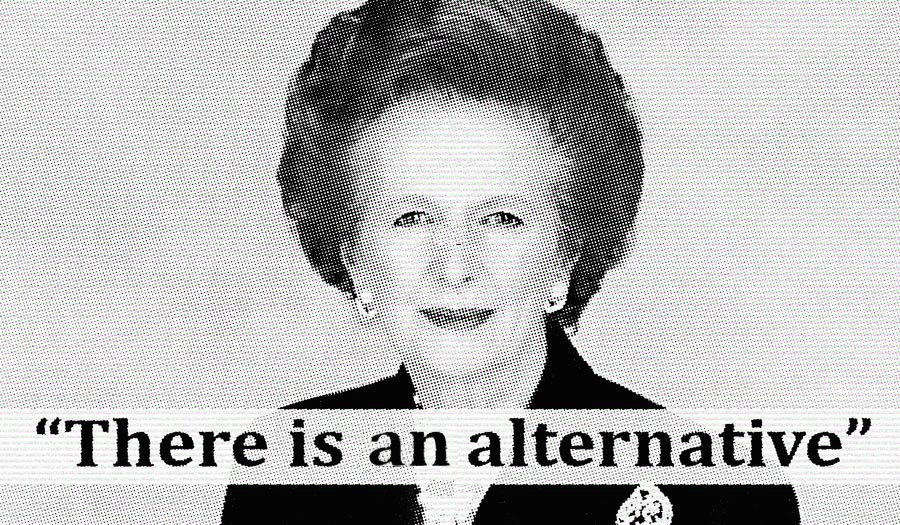The movement to replace neoliberalism is on the ascendency – where should it go next?

Ten years after the crash, the movement to replace neoliberalism is in the ascendency. Well organised campaigns cover everything from the promotion of pluralism in economic curricula to the application of new economic principles in local communities. Academics and campaigners, who prior to the crash were lone voices in the wind, have been joined by a growing chorus of economists and commentators acknowledging that neoliberalism is not working. Importantly, these now include those in mainstream institutions that have become synonymous with the status quo, such as the IMF and OECD. Meanwhile, bottom up movements, surfing a heady mix of social media and dissatisfaction with orthodox economic ideas, are beginning to score political victories across the world.
This is because neoliberalism – the broad set of political-economic ideas and policies which have dominated public life over the last 40 years – has failed, in both theory and in practice. It is in the wake of the global financial crisis that these failures have plumbed new depths. Financial instability looms over economies shackled by insufficient investment. Living standards stagnate and work becomes ever more insecure, shattering the implicit bargain of the entire endeavour. The human costs of this experiment have been enormous, with psychological and non-communicable ill-health becoming the hallmark of a system that cares for little but profit. Inequality, itself linked to ill-health, has grown to levels unseen since the nineteenth century, leading to large power imbalances throughout society. Socio-economic mobility has been further stalled by the erosion of the public realm, from universities to the legal system. Most pressingly, neoliberalism continues to rely on a growth model that is destroying the biophysical preconditions upon which it relies, increasing the chance of collapse in the climate and other natural systems.
Major changes in economic ideas have happened before
Despite this, neoliberalism remains the dominant perspective of most commentary and policy-making in the UK, countries around the world, and the global economic systems through which they linked. But its dominance may be illusory. Rapid changes in ideas have occurred at key junctures in the past. Over the last hundred years, Western political economy has broadly experienced two major periods of breakdown and transition from one political-economic paradigm to another: after the Great Depression and into the post-war consensus of welfare states and the Bretton Woods financial order; and after the crises of the 1970s and into the free market policies of neoliberalism that we live under to this day.
Across each period, the process of a shift to a new sets of ideas can be split into three components:
- its intellectual and academic underpinning, particularly within economics;
- the policies and narratives through which it was expressed in the wider public domain; and
- the political processes – notably elections of governments – which enabled it to be implemented and entrenched.
When considering these components today, it appears the conditions are now apparent for another shift. Across the first, intellectual component, the failure to predict, understand and react to the financial crisis fractured confidence in key pillars of the orthodoxy. This included, for example, the ‘efficient market hypothesis’, which, by asserting that assets could not be consistently mispriced, led generations of economists to shamefully underestimate systemic risk in the financial system. Theoretical failures have been compounded by the inadequacy of policy prescriptions. Most notably, fiscal consolidation and monetary policies have not generated growth or reduced public deficits at the speed anticipated, and so have failed on their own terms. Indeed, elements of the economics profession have consistently found themselves unable to adequately explain a multitude of economic phenomena, ranging from stalling productivity to the impact of quantitative easing. Moreover, orthodox economics has little concern for the major crises of our time, from rising levels of inequality to global environmental change.
New economic ideas are proliferating, but a major shift is still not apparent
In response, a plethora of alternative economic insights have grown up, many of them building on schools that have always contested neoclassical or neoliberal orthodoxies, such as institutional and post-Keynesian economics. Some have emerged in response to particular failings of the orthodoxy, such as behavioural economics and its focus on more accurate modelling of human behaviour. Others pursue a deeper re-conceptualisation of the economy, including complexity economics, which applies complexity science in modelling the economy as a system in constant change, as opposed to equilibrium. However, economics is still dominated by orthodox neoclassical or neoliberal approaches.
While this is a function of the political dominance of these ideas, it also reflects institutional inertias within the discipline. Prestigious journals predominantly publish articles that adhere to the mainstream view, limiting the profile of alternative approaches. In turn, non-mainstream academics can become marginalised, further reducing their ability to publish work at the highest level. Meanwhile, economic curricula at secondary schools and universities remain grounded in the mainstream and so new generations of economists are largely moulded in the image of previous generations.
While these dynamics have attenuated the flow of new economic ideas into the second component of a shift – the development and adoption of counter-narratives and policy proposals – these have nonetheless emerged and built much credence in recent months. Few credible commentators and policymakers now defend the status quo, falling instead along of a continuum of voices calling for reform. Even think tanks who, only a couple of years ago, were staunch supporters of key tenets of neoliberalism now find themselves arguing for change. This became starkly apparent in the 2017 Conservative Party manifesto, which claimed that the party now “… rejected the ideological templates provided by the socialist left and the libertarian right and instead embrace[d] the mainstream view that recognises the good that government can do”.
It is unclear how serious this view is, or how long it will last, but it suggests that a critique of neoliberalism is starting to embed itself into thinking across the political spectrum. Indeed, throughout the West, most government and opposition parties now found their rhetoric on a critique of the status quo. The results differ widely, of course, from the accelerated dismantling of what remains of the New Deal under Donald Trump, to the nationalisation policies of Jeremy Corbyn’s Labour party. And so we see that the third component of a shift – the embedding of a new political-economic paradigm through the election of a supportive government – is not yet apparent.
Change is driven by an ecosystem of influential organisations and individuals
How does a paradigmatic shift come about? Change of this scale is conditional on events that erode confidence in the status quo and heighten the legitimacy of alternative ideas. But it is also a function of the preparedness of those movements espousing an alternative. The conditions for change may come by chance, but the change is won by those most prepared to capitalise on crisis. Those seeking a shift away from the post-war consensus knew this and developed an ecosystem of influence to increase the chance that their ideas would win the day if and when crisis came.
This movement started by focussing on academic ideas, founding the Mont Pèlerin Society to provide a safe space for academics to play out their opposition to a catch-all ‘collectivism’. Members were united in their conclusion that an increased role for the state in economic and social management was incompatible with individual freedom. Around this assertion, they eventually built a coherent narrative and policy proposals that were prosecuted by a well-resourced ecosystem of institutions and networks mobilised to influence public debate and political processes. At its heart was a new breed of ‘knowledge professional’ located within the modern ‘think tank’, politically partisan and focussed on strategic influence as well as policy development. Journalists then provided the means by which neoliberal ideas could enter a wider circulation. This was an avowedly elite theory of change, lavishly funded by economic interests that were set to gain from the ideas being espoused.
By the early 1970s, the neoliberal counter-orthodoxy had organised into a transatlantic network of economists, think tanks and journalists. This network and its ideas increasingly populated political parties and government institutions, creating the intellectual conditions for change and ensuring that the neoliberal movement was prepared to capitalise on crisis. When this crisis came, neoliberal ideas entered government, first under the chaotic Labour and Democrat administrations of the late seventies, and later with the election of Margaret Thatcher and Ronald Reagan. After triumphing in key battles against the commanding institutions of the post-war consensus and New Deal, these administrations scored the ultimate victory when centre-left parties adopted major elements of neoliberalism so that even changes of government could no longer halt the march of its ideas.
Now is the time for the new economics movement to shift to the next gear
If today the conditions for another shift are apparent, how well prepared is the ecosystem seeking that change? This was the question Michael Jacobs and I sought to answer in a recent report that assessed, from a strategic perspective, the movement seeking a shift in economic ideas in the UK. Our main findings were positive. This movement is growing and we think it now covers most of the major functions required to shift the paradigm – from academic groups and think tanks, through communications websites and supportive networks, to funders and political figures. Each year, this movement becomes more influential and is full with talent stretching across generations.
We think there is now broad intellectual convergence across groups around a shared critique of the failings of neoliberalism and the need for a new paradigm. There is slightly looser convergence on the overall goals or values of a new paradigm, largely centring on equity, sustainability and democratisation. However, outside of one or two notable efforts, we have not seen common narratives or policy solutions emerge. Our conclusion is that this results from material barriers to progress, rather than profound differences between groups. These barriers cover three areas:
- the lack of a fully developed intellectual foundation;
- the fact that most organisations are non-mainstream actors, or ‘outsiders’, with ‘insider’ or establishment activity still relatively thin; and
- the absence of coordination and strategic direction covering a critical mass of the ecosystem, including for communications and media outreach, and funding and resource allocation.
In response, we’ve recommended the creation of a platform, or informal coordinating body, to serve the movement by providing a forum for the development of strategic coordination. This could help formalise those networks already emerging within mainstream organisations and provide a safe space to link them to non-mainstream groups in a shared endeavour, collaborating with the brilliant work of other facilitating groups. Such spaces should also exist in countries outside the UK and between countries, as globalisation and environmental change mean this movement will have to be more international than the analogous movements of the past. The challenge should excite us, as the time to accelerate efforts is now.
Younger generations must be given the chance to lead
But too often it feels like change is not happening fast enough. Members of the millennial generation look around and see the chaos of a British government mired in scandal, presiding over a collapse in our international influence at a time when nations need to work closer together than ever before. They wonder what kind of world they will inherit. While the progress described above is heartening – and Britain does sit at the heart of an increasingly global movement – frustration still abounds. A notable, recent example was the INET conference in Edinburgh this October. Held at a time when the ten year anniversaries of the crash have begun, the conference did little to recognise the political moment in which we find ourselves. Moreover, it felt like a chance was missed to facilitate strategic discussions between groups from across the world, and it was remarkable that there was an absence of shared spaces for people to meet and talk. Many came away from the conference feeling disappointed, doubting whether much new economic thinking has been done, or whether it would make a difference at this crucial time.
There are many reasons for this, and they echo throughout the movement as a whole. Firstly, there is a lack of diversity. This ranges from a large gender disparity, through the representation of cultures and nations, to a lack of intellectual pluralism. It has been heartening to see INET and others make some efforts to increase the participation of women, but change must come quicker and be of sufficient force to overcome large structural barriers. We see the same with the representation of people across the income distribution. Younger generations must also be given more power and opportunities, both to act and to learn. It will be they who have to inherit the world neoliberalism made, or unmade. And across all of these areas, we can no longer afford to follow a ‘common room theory of change’ – that if you win the intellectual argument, you change the world. This has not and will never be the case, as the Koch brothers and the other heirs to Mont Pèlerin so ably prove.
In the case of INET, the Young Scholars Initiative’s Festival for New Economic Thinking, organised before the INET conference proper, provided an exciting shared space that brought together a community to celebrate and plan. In doing so, it allowed a younger generation to appreciate the progress that has been made and to build for the future. This future does not look bright and time is running out. But, as we found across the movement in the UK, the millennial generation, and those below it, are facing the challenge with ambition and excitement.
In an oft quoted remark, Milton Friedman, a key part of the neoliberal ecosystem of influence, once described its basic function as being to “develop alternatives to existing policies, to keep them alive and available until the politically impossible becomes the politically inevitable”. We do not yet have a critical mass of those alternatives and a common narrative around which to bind them. More shared spaces and coordination are needed to accelerate the process by which we reach this point. And while those spaces should be populated by all ages, the torch must be passed to a younger generation. It is they who will one day make the impossible inevitable.






